Humane Society of NY Announces Renovations to Reopen to the Public After Falsely Attributing Years-long Closure to COVID
The News
After claiming for over 2.5 years that the Humane Society of New York (HSNY) has been closed to the public due to COVID, the Executive Director of the prominent animal shelter and vet clinic, Sandra DeFeo, has posted a public statement announcing renovations to the lobby that will enable the building to reopen “in 2023.” In 2018, a client of the HSNY’s vet clinic sued the organization because the building is not wheelchair accessible under Americans with Disabilities Act (ADA) guidelines. In talks with shelter animal advocates who have been calling on DeFeo to send the HSNY’s animals to shelters that are open to adopters or to foster homes, DeFeo claimed that the ADA issues had been settled and were unrelated to the ongoing closure of the building.
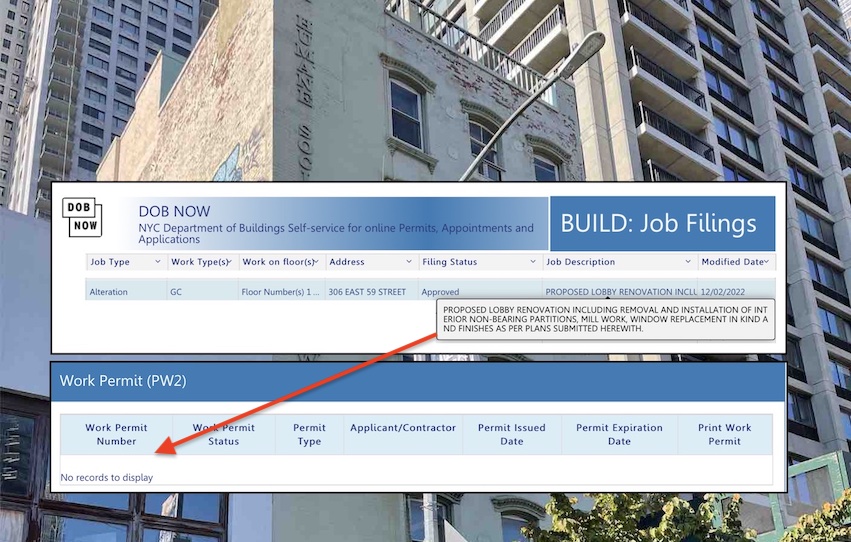
The Humane Society of New York claims to have begun renovating the lobby in order to make it ADA compliant despite not yet having received a work permit from the NYC Department of Buildings
While the lobby renovations have not yet begun, DeFeo, in her statement, uses a photo of the HSNY’s scaffolded building to suggest that they have. The exterior scaffolding was erected to facilitate repairs to the facade and is unrelated to the interior lobby renovation needed to make the building ADA compliant. As of December 7th, the NYC Department of Buildings has not yet issued the HSNY with a work permit to make the lobby renovations that DeFeo claims are already underway.
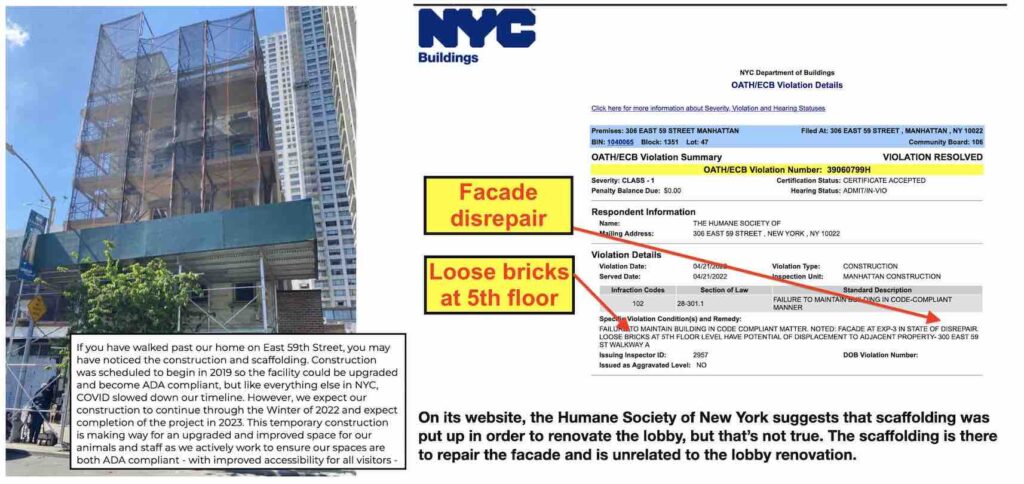
On its website, the Humane Society of New York suggests that scaffolding was erected in order to renovate the lobby, but that’s not true. The scaffolding is there
solely to repair the facade.
In her statement, DeFeo also claims that she intended to begin the lobby renovations in 2019 and attributes the delay to COVID. A search of the Department of Buildings public database, however, shows no building permit applications in 2019. In addition, a 2018 court filing about the ADA lawsuit shows that the HSNY argued against renovating the building to make it wheelchair accessible.
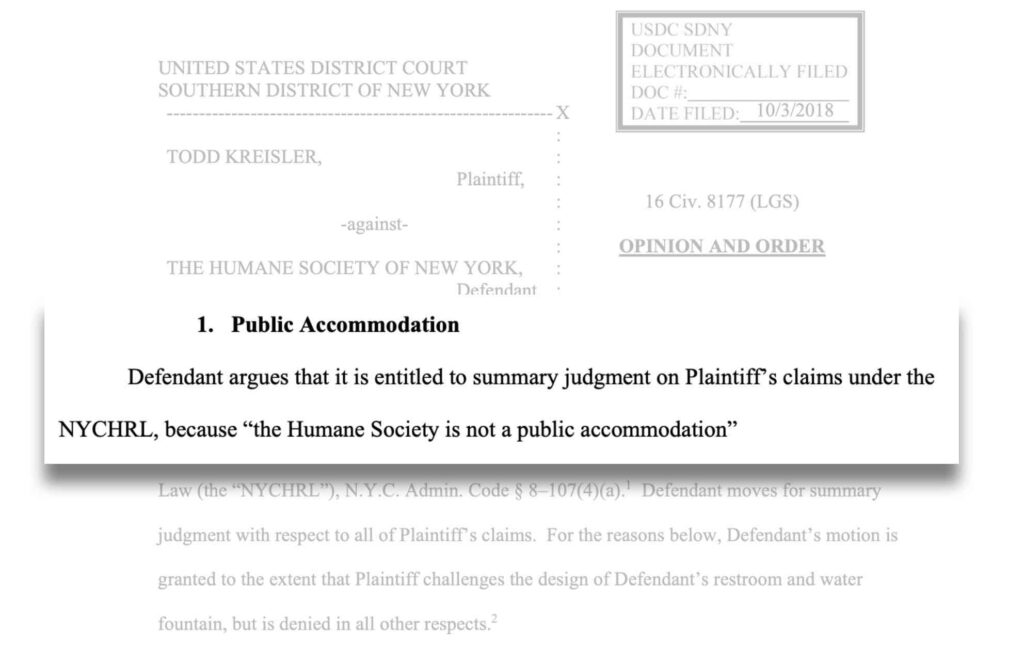
The Executive Director of the Humane Society of New York, Sandra DeFeo, claims that she planned to renovate the lobby in 2019, but that contradicts 2018 court documents demonstrating her opposition to the renovations
Bonnie Tischler, the former Adoption Director of 22 years who retired in 2020, says that, in 2019, DeFeo made no mention of making the building ADA compliant and that DeFeo told her in 2021 that the ADA lawsuit was settled and that the building was closed due to COVID. “Sandra [DeFeo] had no intention of making the ADA renovations and was planning to keep members of the public out of the building indefinitely. She’s only moving forward with the renovations now — four years later — because of the negative spotlight cast by the protests.”
DeFeo states that she expects “completion of the project in 2023.” However, without a permit and with widespread construction delays due to labor shortages and supply chain issues, she has no way of knowing when construction will be completed.
Animal rights activists became aware that animals were being warehoused at the Humane Society of New York in July 2021 when a whistleblower sent a letter to a prominent shelter advocate informing her that adoptions had come to a virtual standstill 15 months earlier and that DeFeo was keeping the building closed to the public under false pretenses. After conducting an investigation which corroborated the allegations, Donny Moss of TheirTurn and other animal rights activists began calling on the HSNY to send the animals in its adoption center to shelters that are open to the public or to foster homes, where they could live outside of a cage with a family and where adopters could meet them. During a call with Moss in August 2021, DeFeo claimed that adoptions were taking place and that the animals are fine in their “apartments,” a term that DeFeo routinely uses to describe shelter cages. When asked why she wouldn’t send animals to foster homes so that they’re not living in cages, she said that the HSNY “is their foster home.”
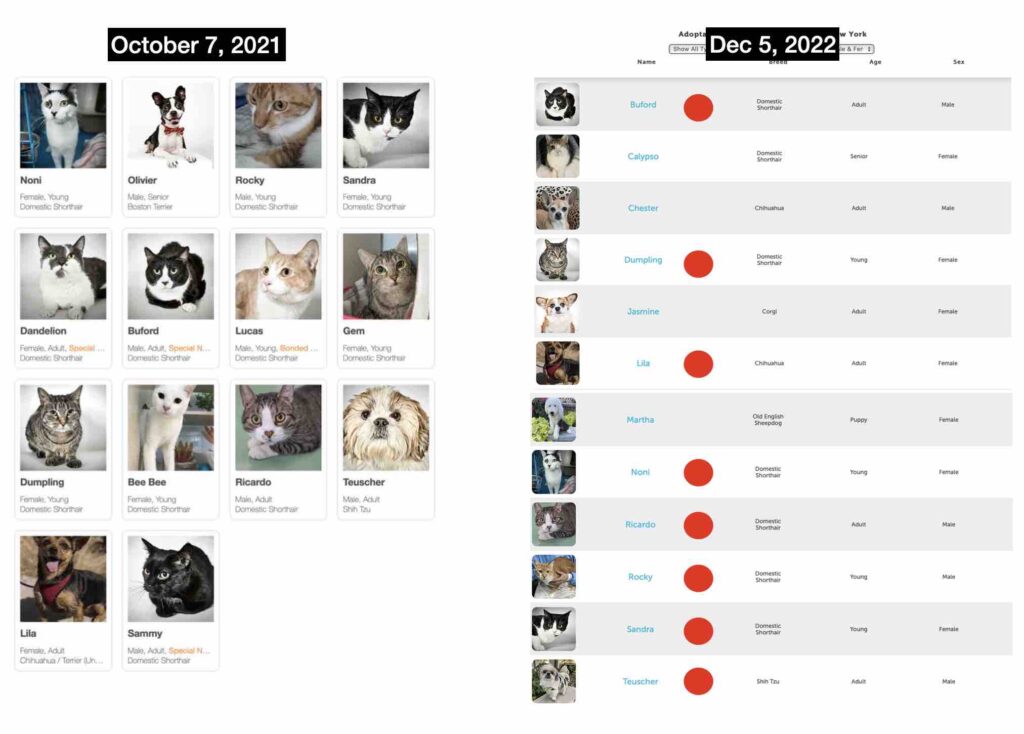
Eight of the 14 animals listed on the Humane Society of New York’s adoption page in October 2021 were still posted in December 2022 — 14 months later. The Humane Society says that it posts “just a few” of their animals online. With the building closed to the public, adopters have no way of knowing that the other animals in need of a home even exist.
In December 2021, Tischler sent letters and/or emails to all of the HSNY’s board members, many of whom she knew well from having worked there for so long, to sound the alarm about the warehousing of animals and to ask them to intervene. Of the 15 board members she contacted, two responded and agreed to speak to her. During the calls, Tischler told them the activists would stop protesting the HSNY if the board provided her with proof that “adoptions have continued” since the building was closed to the public, as DeFeo was claiming. The board members agreed, but within two weeks, they resigned without providing the information. Tischler suspects that the adoption numbers were so low that DeFeo refused to share the data with them.
In a one month period in 2021, three board members resigned amid the controversy, but their departures, Tischler said, “did nothing to help the animals who were warehoused on their watch and who they left behind when they quit.”
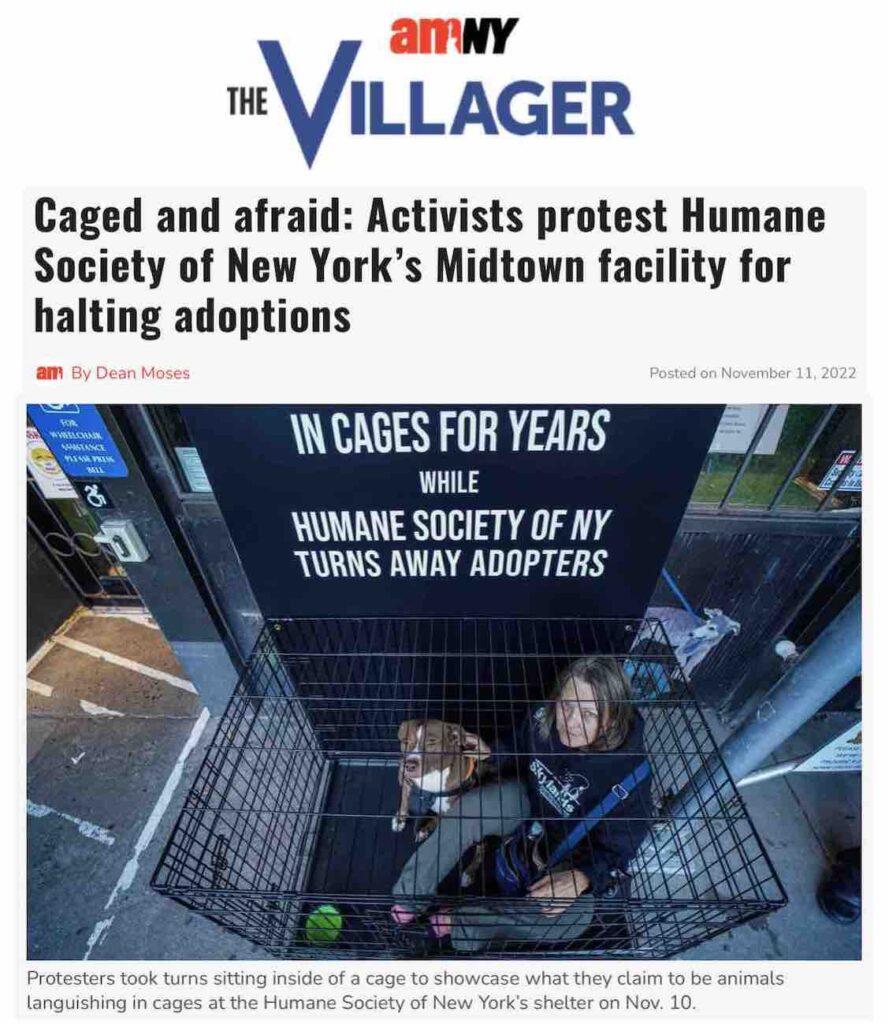
AM New York, a daily newspaper in New York City, published a story about the campaign to help the cats and dogs being warehoused at the Humane Society of New York
In July 2022, the activists escalated their efforts on behalf of the shelter animals by disrupting Broadway Barks, an annual star-studded animal adoption event in the theater district. When Bill Berloni, an animal trainer with the Humane Society of New York, took the stage, activists pulled out posters and chanted “Stop The Hoarding” on bullhorns to draw attention to the plight of the animals. Bernadette Peters, the host of Broadway Barks, attempted to discredit and marginalize the activists by claiming that the HSNY is open to the public. Twice she said, “Anybody can take a tour of the Humane Society.” Berloni, who remained on stage during the protest, did not correct her. The following day, Christina Fritz, a vet clinic client who has been critical of the the organization’s refusal to allow clients and adopters into the building, called DeFeo to ask for a tour, referencing Bernadette Peters “anybody can take a tour” remark. In response, DeFeo said, “That’s not correct. I don’t know why she might have said that.” An audio recording of that exchange is included in the following video:
In the statement on the Humane Society’s homepage, DeFeo claims that the HSNY has facilitated about 160 adoptions since she closed the building to the public in March 2020. If true, that represents an average of about one animal per week, “an abysmal number,” says Tischler “for a large, prominent shelter in a busy and wealthy residential neighborhood that raises millions of dollars each year in donations.” Tischler and the other activists believe that the average number of weekly adoptions has been significantly lower than one.

Testimonials posted online about failed attempts to adopt animals from the Humane Society of New York
In early December, the HSNY sent out its annual holiday fundraising letter soliciting donations for its adoption center and vet clinic. The letter is signed by Virginia Chipurnoi, the President of the Board. Tischler and other former HSNY employees believe that Chipurnoi, who is 88 years old, isn’t aware of the letter because she was showing signs of dementia four years ago. In 2021 and 2022, several people who had personal relationships with Chipurnoi sent her emails and texts in an effort to discuss the concerns raised by the activists. She didn’t respond to any of them. “It’s a perfect storm for the animals,” said Tischler. “You have an unsupervised Executive Director who believes that cages are ‘apartments’ who is running an adoption center that’s closed to adopters.”
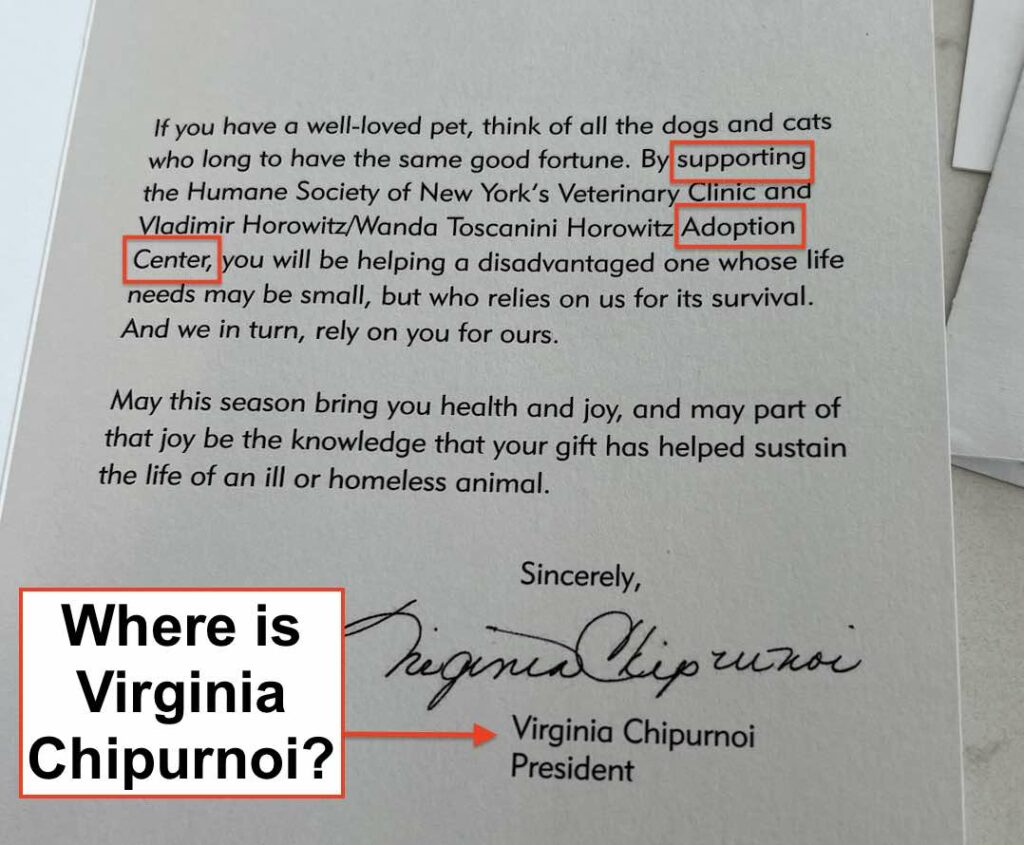
The Humane Society of New York solicits contributions for its adoption center even though it has been closed to the public for over 2.5 years and adoptions have come to a virtual standstill
Activists say that DeFeo’s decision to renovate the lobby instead of keeping the building closed to the public indefinitely is one of several ways they know they’re making a positive impact. DeFeo has also begun to promote adoptions more routinely and to allow vet clinic clients into the lobby, despite the legal risk. Whether or not these changes help the animals who have been stuck in cages for 2.5 years or longer remains to be seen.
For their part, the activists, whose efforts continue to be validated by people who share accounts of failed efforts to adopt from the shelter, will continue to call on Sandra DeFeo and the six veterinarians who work in the HSNY’s clinic to send the animals to shelters that are open to adopters or to foster homes. The veterinarians, Drs. Yaron Schmid, Shingo Soeda, Lauren Postler, Ralph Gutierrez, Liz Higgins and Ellen Hirshberg, have ignored the activists pleas to intervene on behalf of the animals who are being warehoused on their watch.
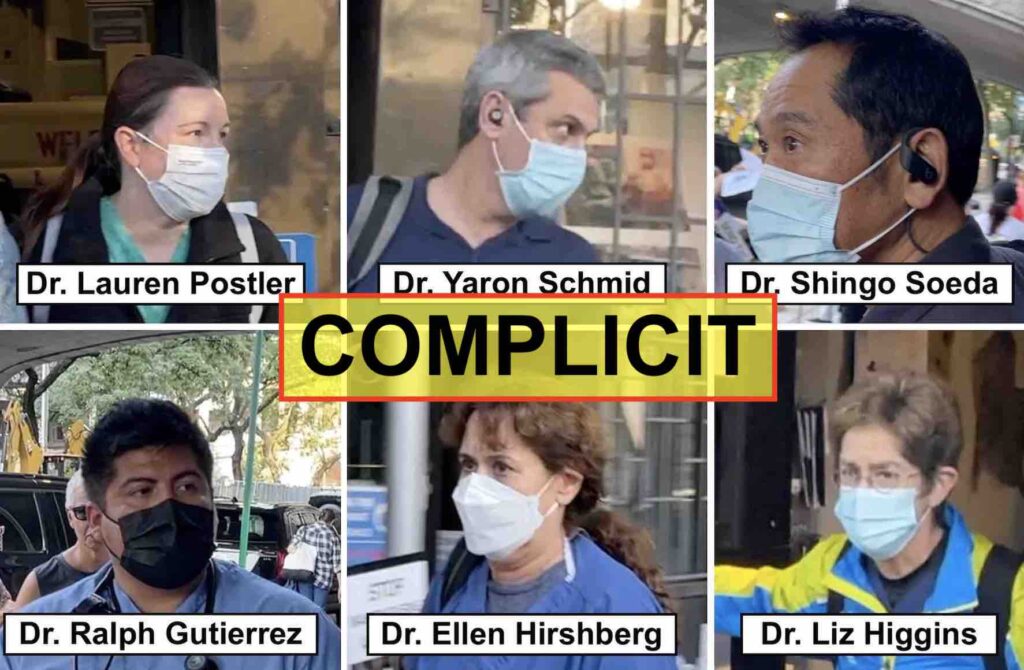
Shelter advocates say that the veterinarians who work in the Humane Society of New York’s clinic are turning a blind eye to the warehousing of animals in the organization’s adoption center. (From left to right: Lauren Postler, Yaron Schmid, Shingo Soeda, Ralph Gutierrez, Ellen Hirshberg and Liz Higgins)








To begin with, I commend all the efforts and actions taken by animal lovers to help rectify this situation. My question is: Where do people like myself, on fixed incomes go to get veterinarian treatment for our fur babies when ALL THE OTHER PLACES ARE COMPLETELY OUT OF OUR PRICE RANGE? I need to take my fur babies to the Humane Society for care.
If you’re lucky enough to be able to get appointments at the Humane Society of New York, then we suggest that you continue going there. We are not trying to shut down the clinic; we are merely asking that they not run a shelter if they’re not going to facilitate adoptions in earnest. The Executive Directly has stated on multiple occasions that she believes that the shelter is a “foster home” and that cages are “apartments.” In the absence of accountability, she will continue to warehouse the animals instead of doing the work to find them loving homes.
I am not sure what a “vet specialist” could have meant when saying that your cat “got..” FIP from being warehoused at the HS shelter. It seems to imply that FIP is something that a cat catches from poor conditions which is not really accurate. FIP comes from a common coronavirus that many cats get – most cats in most shelters. It is unavoidable for the most part. Very treatable upper respiratory condition and most cats get over it without a problem. (As it is a virus, only the symptoms can be treated.) But some few cats have what is a fairly uncomplicated coronavirus mutate into FIP. Your cat did not catch FIP from being kept at the HS. She possibly got a coronavirus there, which she could have gotten at any shelter. It happens more to purebreds and more to younger cats. Something just goes wrong with the immune system, and it becomes FIP. I do hope that you were able to treat your cat and that you were informed about the treatment that is available. My cat was one of the worst ever neuro, dry, FIP cases. He is completely recovered from FIP after being treated. (Research Dr. Pedersen/FIP if you are not aware of treatment.)
I am not saying that there is nothing wrong with this facility, with Sandra DeFayo, with the vets, with the board, with the whole damned organization. Something is very very wrong. But to make a case, do not use “My cat got FIP from being warehoused at the Humane Society shelter.” It would only serve to weaken the case against them as it is easily dismissable as misinformation.
Oh and I thought NY had become a no kill city? So f-cked up!!
I am so heartbroken for these precious babies. Look what happen to the AKC on Lexington Avenue. It seems these people are collecting a pay check to do absolutely nothing. It’s supposed to be all the animals when going into that profession or working for such a well known shelter. Is there away to get the ASPCA involved or other organizations involved. I hate to think to CACC cause they are a kill shelter.
Hi,
I adopted a cat from the HSNY – she ended up with FIP (dry), the vet specialist believes she got this from the shelter as she was warehoused for over a year. Please contact me and include Bonnie Tischler for details. We need to take what is happening at the HSNY to the attorney general of NY
DEFOE IS DISGRACEFUL THEY CONTINUALLY HARM INNOCENT ANIMALS
That’s great news—or potentially great news—DeFeo is completely untrustworthy of course. But has only reached this point because of everyone’s efforts.